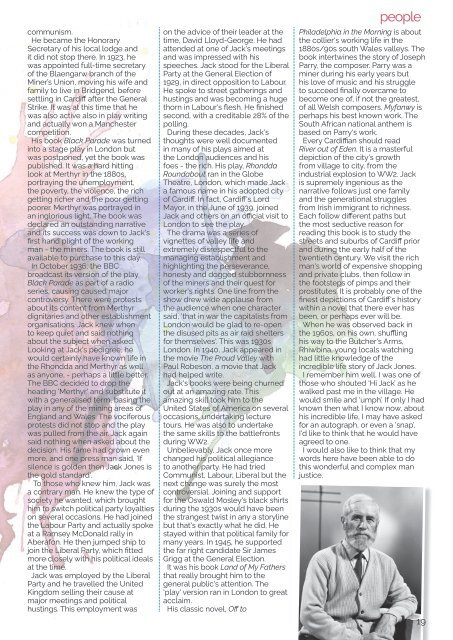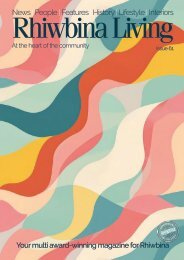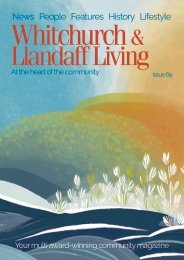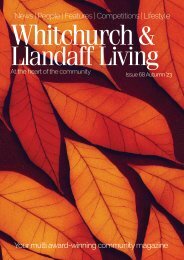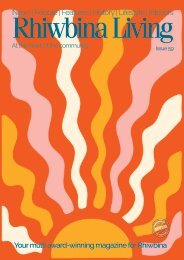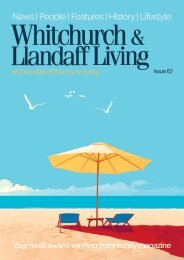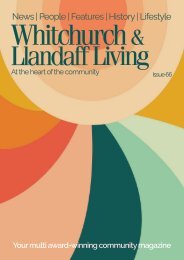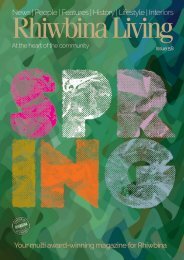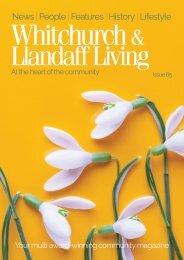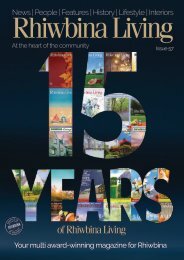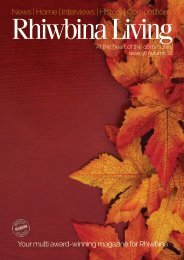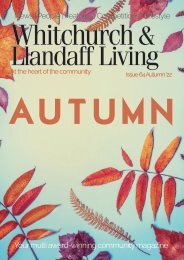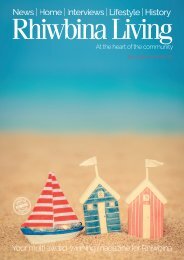Whitchurch and Llandaff Living Issue 62
Spring 2022 issue of the award-winning Whitchurch and Llandaff Living
Spring 2022 issue of the award-winning Whitchurch and Llandaff Living
You also want an ePaper? Increase the reach of your titles
YUMPU automatically turns print PDFs into web optimized ePapers that Google loves.
communism.<br />
He became the Honorary<br />
Secretary of his local lodge <strong>and</strong><br />
it did not stop there. In 1923, he<br />
was appointed full-time secretary<br />
of the Blaengarw branch of the<br />
Miner’s Union, moving his wife <strong>and</strong><br />
family to live in Bridgend, before<br />
settling in Cardiff after the General<br />
Strike. It was at this time that he<br />
was also active also in play writing<br />
<strong>and</strong> actually won a Manchester<br />
competition.<br />
His book Black Parade was turned<br />
into a stage play in London but<br />
was postponed, yet the book was<br />
published. It was a hard hitting<br />
look at Merthyr in the 1880s,<br />
portraying the unemployment,<br />
the poverty, the violence, the rich<br />
getting richer <strong>and</strong> the poor getting<br />
poorer. Merthyr was portrayed in<br />
an inglorious light. The book was<br />
declared an outst<strong>and</strong>ing narrative<br />
<strong>and</strong> its success was down to Jack's<br />
first h<strong>and</strong> plight of the working<br />
man - the miners. The book is still<br />
available to purchase to this day.<br />
In October 1936, the BBC<br />
broadcast its version of the play<br />
Black Parade as part of a radio<br />
series, causing caused major<br />
controversy. There were protests<br />
about its content from Merthyr<br />
dignitaries <strong>and</strong> other establishment<br />
organisations. Jack knew when<br />
to keep quiet <strong>and</strong> said nothing<br />
about the subject when asked.<br />
Looking at Jack's pedigree, he<br />
would certainly have known life in<br />
the Rhondda <strong>and</strong> Merthyr as well<br />
as anyone, - perhaps a little better.<br />
The BBC decided to drop the<br />
heading 'Merthyr' <strong>and</strong> substitute it<br />
with a generalised term, basing the<br />
play in any of the mining areas of<br />
Engl<strong>and</strong> <strong>and</strong> Wales. The vociferous<br />
protests did not stop <strong>and</strong> the play<br />
was pulled from the air. Jack again<br />
said nothing when asked about the<br />
decision. His fame had grown even<br />
more, <strong>and</strong> one press man said, 'If<br />
silence is golden then Jack Jones is<br />
the gold st<strong>and</strong>ard'.<br />
To those who knew him, Jack was<br />
a contrary man. He knew the type of<br />
society he wanted, which brought<br />
him to switch political party loyalties<br />
on several occasions. He had joined<br />
the Labour Party <strong>and</strong> actually spoke<br />
at a Ramsey McDonald rally in<br />
Aberafon. He then jumped ship to<br />
join the Liberal Party, which fitted<br />
more closely with his political ideals<br />
at the time.<br />
Jack was employed by the Liberal<br />
Party <strong>and</strong> he travelled the United<br />
Kingdom selling their cause at<br />
major meetings <strong>and</strong> political<br />
hustings. This employment was<br />
on the advice of their leader at the<br />
time, David Lloyd-George. He had<br />
attended at one of Jack's meetings<br />
<strong>and</strong> was impressed with his<br />
speeches. Jack stood for the Liberal<br />
Party at the General Election of<br />
1929, in direct opposition to Labour.<br />
He spoke to street gatherings <strong>and</strong><br />
hustings <strong>and</strong> was becoming a huge<br />
thorn in Labour's flesh. He finished<br />
second, with a creditable 28% of the<br />
polling.<br />
During these decades, Jack's<br />
thoughts were well documented<br />
in many of his plays aimed at<br />
the London audiences <strong>and</strong> his<br />
foes - the rich. His play, Rhondda<br />
Roundabout ran in the Globe<br />
Theatre, London, which made Jack<br />
a famous name in his adopted city<br />
of Cardiff. In fact, Cardiff's Lord<br />
Mayor, in the June of 1939, joined<br />
Jack <strong>and</strong> others on an official visit to<br />
London to see the play.<br />
The drama was a series of<br />
vignettes of valley life <strong>and</strong><br />
extremely disrespectful to the<br />
managing establishment <strong>and</strong><br />
highlighting the perseverance,<br />
honesty <strong>and</strong> dogged stubbornness<br />
of the miners <strong>and</strong> their quest for<br />
worker's rights. One line from the<br />
show drew wide applause from<br />
the audience when one character<br />
said, 'that in war the capitalists from<br />
London would be glad to re-open<br />
the disused pits as air raid shelters<br />
for themselves'. This was 1930s<br />
London. In 1940, Jack appeared in<br />
the movie The Proud Valley with<br />
Paul Robeson, a movie that Jack<br />
had helped write.<br />
Jack's books were being churned<br />
out at an amazing rate. This<br />
amazing skill took him to the<br />
United States of America on several<br />
occasions, undertaking lecture<br />
tours. He was also to undertake<br />
the same skills to the battlefronts<br />
during WW2.<br />
Unbelievably, Jack once more<br />
changed his political allegiance<br />
to another party. He had tried<br />
Communist, Labour, Liberal but the<br />
next change was surely the most<br />
controversial. Joining <strong>and</strong> support<br />
for the Oswald Mosley's black shirts<br />
during the 1930s would have been<br />
the strangest twist in any a storyline<br />
but that's exactly what he did. He<br />
stayed within that political family for<br />
many years. In 1945, he supported<br />
the far right c<strong>and</strong>idate Sir James<br />
Grigg at the General Election.<br />
It was his book L<strong>and</strong> of My Fathers<br />
that really brought him to the<br />
general public's attention. The<br />
'play' version ran in London to great<br />
acclaim.<br />
His classic novel, Off to<br />
people<br />
Philadelphia in the Morning is about<br />
the collier's working life in the<br />
1880s/90s south Wales valleys. The<br />
book intertwines the story of Joseph<br />
Parry, the composer. Parry was a<br />
miner during his early years but<br />
his love of music <strong>and</strong> his struggle<br />
to succeed finally overcame to<br />
become one of, if not the greatest,<br />
of all Welsh composers. Myfanwy is<br />
perhaps his best known work. The<br />
South African national anthem is<br />
based on Parry's work.<br />
Every Cardiffian should read<br />
River out of Eden. It is a masterful<br />
depiction of the city's growth<br />
from village to city, from the<br />
industrial explosion to WW2. Jack<br />
is supremely ingenious as the<br />
narrative follows just one family<br />
<strong>and</strong> the generational struggles<br />
from Irish immigrant to richness.<br />
Each follow different paths but<br />
the most seductive reason for<br />
reading this book is to study the<br />
streets <strong>and</strong> suburbs of Cardiff prior<br />
<strong>and</strong> during the early half of the<br />
twentieth century. We visit the rich<br />
man's world of expensive shopping<br />
<strong>and</strong> private clubs, then follow in<br />
the footsteps of pimps <strong>and</strong> their<br />
prostitutes. It is probably one of the<br />
finest depictions of Cardiff's history<br />
within a novel that there ever has<br />
been, or perhaps ever will be.<br />
When he was observed back in<br />
the 1960s, on his own, shuffling<br />
his way to the Butcher's Arms,<br />
Rhiwbina, young locals watching<br />
had little knowledge of the<br />
incredible life story of Jack Jones.<br />
I remember him well. I was one of<br />
those who shouted ‘Hi Jack’ as he<br />
walked past me in the village. He<br />
would smile <strong>and</strong> ‘umph’. If only I had<br />
known then what I know now, about<br />
his incredible life, I may have asked<br />
for an autograph, or even a ‘snap’,<br />
I'd like to think that he would have<br />
agreed to one.<br />
I would also like to think that my<br />
words here have been able to do<br />
this wonderful <strong>and</strong> complex man<br />
justice.<br />
19


